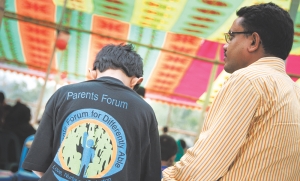| Home - Back Issues - The Team - Contact Us |
 |
| Volume 11 |Issue 08| February 24, 2012 | |
|
|
Endeavour
The Power of Numbers Parents of children with special needs get together to pool their knowledge Ahsan Z Khan
Friday, 17 February at Mohishashi, Dhamrai. It's a picnic with children running about, parents running after them, and the usual commotion that one would expect from a picnic with 650 children and parents. It's the same kind of joy you see in children as they kick around a football during sports activities, or the excitement of winning a race. Except, these children are different. Most of them are autistic. Signs of autism include lack of or delay in developing spoken language, repetitive use of words, little or no eye contact, lack of interest in peers, make-believe play, and repetitive hand-flapping, among other characteristics. In Bangladesh, there has been a dramatic increase in the visible number of such children. It is estimated by the Ministry of Social Welfare that the total number could be as high as 1.4 million, of whom only a few hundred have been diagnosed. Another estimation is that one in every 500 children in Bangladesh has autism, meaning that the approximate number of children with Autism Spectrum Disorders (ASDs) in Bangladesh is no less than 280,000. Socials barriers make it incredibly difficult for parents to deal with their predicament, as does the level of stress involved in parenting. The uniqueness of each case of autism makes the experience different for each parent. To make matters more complicated, there is controversy regarding the proper treatment of autism or autism spectrum disorder, ASD, which is still a relatively new phenomenon in Bangladesh. In some instances this has led to improper treatment autistic children. Knowledge on the subject is relatively weak amongst key stakeholders. The fact is, these children need individual attention on a case by case basis. Information sharing is key towards progress in this sector in Bangladesh, and some parents understand this only too well.
“When you look at the child, it gives you strength to move forward. A single smile can wipe out all the pain of struggle,” says Sanjida Rahman Danny, a single working parent with an autistic child. She has been working tirelessly to advocate better treatment of autistic children. Towards that end she formed Parents Forum for Differently Able. Parents Forum is working for children and persons with Autism, Cerebral Palsy, Down Syndromes, Intellectual and Neurological Disabilities. To bring a little sunshine in their lives, Parents Forum has organised the picnic on Friday, 17 February at Mohishashi, Dhamrai. The event was given its due importance with the presence of the Minister of Social Welfare Enamul Hoque Mostofa Shaheed Present and Parliament Member Benjir Ahmed of Dhamrai. Parents Forum for Differently Able is a voluntary social welfare organisation formed, supported and managed by parents of special children. They have been advocating on behalf of these children and persons, to gain and protect their legal rights. They have been lobbying to provide more concessions and schemes to improve the quality of lives, the right for inclusive education, and to make them part of the mainstream and standardise a special education system. Parents Forum also has plans to train parents to support their special children, empower them through vocational training (i.e. cooking and bakery training, tailoring, handicrafts training, computer training) so these children can live as independently as possible within our community. They have been working to bring all parents under a common umbrella, networking, information sharing, sharing pain and concerns, counselling, awareness raising and creating a common bond of understanding and action among parents. These parents understand the importance of coming together to face their challenges. It's time we started supporting them too.
Copyright
(R) thedailystar.net 2012 |



